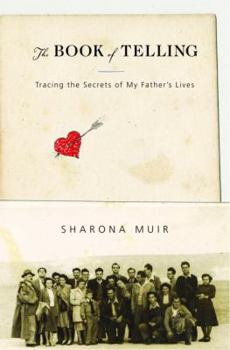The Book of Telling: Tracing the Secrets of My Father's Lives
Select Format
Select Condition 
Book Overview
After her father died, Sharona Muir learned by chance that he had invented Israel' s first rocket. Muir' s parents divorced when she was very young, but she adored the father she saw on Saturday... This description may be from another edition of this product.
Format:Hardcover
Language:English
ISBN:0805242341
ISBN13:9780805242348
Release Date:June 2005
Publisher:Schocken
Length:288 Pages
Weight:0.90 lbs.
Dimensions:8.0" x 0.8" x 6.0"
Customer Reviews
3 ratings
Missing pages throughout book
Published by Zoe , 1 year ago
I just received this book in the mail and I’m disappointed that the first few pages, chapter 1, has been completely ripped out. Itzhak Bentov is my favourite author and I was really looking forward to reading this. Of course I’m still appreciative for the book and it was inexpensive but I wouldn’t normally buy a book knowing the first chapter has been ripped out. ~ found more pages ripped out throughout book, truly disappointing!
This book is an awesome read!
Published by Thriftbooks.com User , 17 years ago
Muir's style is incredibly striking and her characters and stories are interesting and unique as is the way she weaves everything together. Not only is book relevant historically, but touching as father/daughter relationship is described. Pulls at the heart of anyone who has loved and lost her daddy. This is a great book to read and discuss with friends.
A Fascinating Book For Our Times
Published by Thriftbooks.com User , 17 years ago
With rockets attacking Israel, there's no better book to read than this lovely, fascinating memoir/history, recently rave-reviewed in the "Times Literary Supplement" and "The Jerusalem Post." There is so much to think about in this rich book, and the prose stands up to many readings. It's billed as a memoir but is so much more than that. Muir, the only child of an enigmatic, divorced father who kept her a secret from his friends, discovered after his death that he had invented Israel's first rocket, in a top-secret group of weaspons scientists during Israel's '48 war. These scientists later became rthe creators of everything from Israel's nukes to her national water system, but their '48 story was untold. By contrast, Muir's father, Itzhak Bentov, left Israel for the US where, as a freelance inventor in the basement of his house, he created the world's first remote-operated cardiac catheter, still in use. Bentov also gained acclaim as the author of the New Age bestseller Stalking The Wild Pendulum: On the Mechanics of Consciousness. Muir's book weaves together her memories of a "mad scientist" father, who was her inspiration and her heartbreak, as well as the wartime stories of his comrades, and her personal search for the meanings of these histories. A family tale in its personal complexity, the book is also timely because of the image of the rocket: you can't help comparing Hezbollah's 10,000-odd rockets with Israel's first rocket (Bentov's brainchild) which was 15 inches long and improvised out of a water-pipe. It symbolized a newly-born Israel's desperate creativity. Bentov's assistant on the rocket project tells us: "It was like, sort of, a miniature Manhattan Project. True, we didn't have the time or the resources to develop anything new. We barely had the time to copy what already existed to save ourselves. But that rocket, I can't tell you how exciting it was. Because it meant we had a future." The group's executive commander, a refugee from Russia, revealed that the scientists' creativity began within, by having to invent new selves after their roots were erased by the Holocaust. In his words: "I had no past, no family. I was no one. I could do anything." The former head of Israel's missile programme sums it up: "Instead of tradition, we had improvisation." Beyond the timeliness of the book, however, is a universal and timeless theme: the nature of invention itself. A poet who loves science, Muir lovingly and brilliantly depicts the passion of inventors and gives each of their inventions poetic resonance. The "invisible mine," produced by one Israeli scientist, becomes a metaphor for the destructive potential of scientific creativity when applied to military uses. The recoilless cannon, which seemingly violates Newton' s law of action and reaction, accompanies her father's, and Israel's, urge to move forward without reacting to the devastation of the past. In a brilliant an






